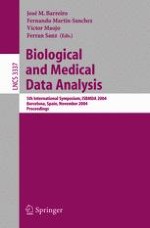2004 | OriginalPaper | Buchkapitel
Selective Classifiers Can Be Too Restrictive: A Case-Study in Oesophageal Cancer
verfasst von : Rosa Blanco, Linda C. van der Gaag, Iñaki Inza, Pedro Larrañaga
Erschienen in: Biological and Medical Data Analysis
Verlag: Springer Berlin Heidelberg
Enthalten in: Professional Book Archive
Aktivieren Sie unsere intelligente Suche, um passende Fachinhalte oder Patente zu finden.
Wählen Sie Textabschnitte aus um mit Künstlicher Intelligenz passenden Patente zu finden. powered by
Markieren Sie Textabschnitte, um KI-gestützt weitere passende Inhalte zu finden. powered by
Real-life datasets in biomedicine often include missing values. When learning a Bayesian network classifier from such a dataset, the missing values are typically filled in by means of an imputation method to arrive at a complete dataset. The thus completed dataset then is used for the classifier’s construction. When learning a selective classifier, also the selection of appropriate features is based upon the completed data. The resulting classifier, however, is likely to be used in the original real-life setting where it is again confronted with missing values. By means of a real-life dataset in the field of oesophageal cancer that includes a relatively large number of missing values, we argue that especially the wrapper approach to feature selection may result in classifiers that are too selective for such a setting and that, in fact, some redundancy is required to arrive at a reasonable classification accuracy in practice.
